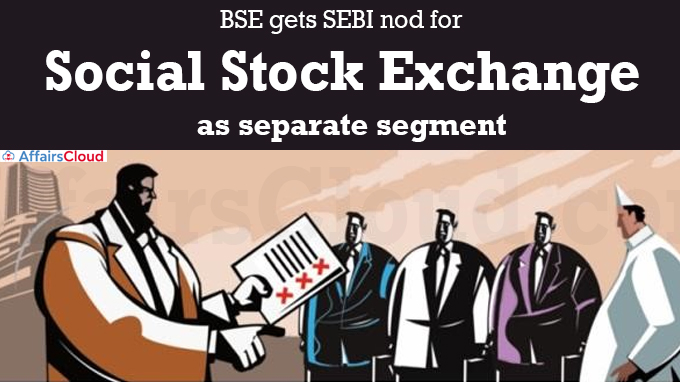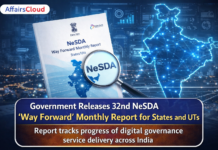 On October 7, 2022, the Securities and Exchange Board of India (SEBI) granted its in-principle approval to BSE for introducing a social stock exchange (SSE) as a separate segment from existing stock exchanges.
On October 7, 2022, the Securities and Exchange Board of India (SEBI) granted its in-principle approval to BSE for introducing a social stock exchange (SSE) as a separate segment from existing stock exchanges.
- SSE will provide Social Enterprises (SEs) with an additional avenue to raise funds.
- Many countries including the UK (United Kingdom), Canada and Brazil already have SSEs.
What is SSE?
i.It enables the listing of Non-Profit Organizations (NPOs) and for-profit SEs that are engaged in 16 social activities approved by the market regulator.
- These activities include eradicating hunger, poverty, malnutrition and inequality; promoting healthcare, supporting education, employability and livelihoods; gender equality empowerment of women and LGBTQIA+ (lesbian, gay, bisexual, transgender, queer, questioning, intersex, pansexual, two-spirit, asexual, and ally) communities; and supporting incubators of SEs.
ii.The eligible SE can raise funds through equity, issue of zero-coupons zero-principal bonds, mutual funds, social impact funds and development impact bonds.
- Corporate foundations, political or religious organizations or activities, professional or trade associations, infrastructure and housing companies, except affordable housing, are not eligible as SEs.
Key points from Framework for SSEs:
In September 2022, SEBI notified a detailed framework for SSEs to provide SEs with an additional avenue to raise funds.
i.Minimum Requirement for NPO: A NPO desirous of registration on SSE, in terms of Regulation 292F(1) of SEBI (Issue of Capital and Disclosure Requirements) Regulations, 2018 (ICDR Regulations), shall fulfil the following criteria:
- NPO needs to be registered as a charitable trust and should be registered for at least 3years.
- It has spent at least Rs 50 Lakh annually in the past financial year and should have received a funding of at least Rs 10 Lakh in the past financial year.
ii.Listed NPO will have to submit a statement of utilization of funds to SSE, as mandated under Sebi’s rules within 45 days from the end of quarter.
iii.NPOs also require annual disclosure of the details of top five donors or investors in terms of budget, scale of operations, including employee and volunteer strength, governance structure, financial statement, programme-wise fund utilization for the year and auditors report and auditor details.
iv.SEs also need to disclose Annual Impact Report (AIR) within 90 days from the end of financial year, showcasing the qualitative and quantitative aspects.
Click Here for Official Framework Notification
Background of SSE:
It was proposed by Union Minister Nirmala Sitharaman, Ministry of Finance in her Budget speech for FY2019-20. After that, SEBI, in September, 2019 constituted a working group (WG) under the chairmanship of Ishaat Hussain (Ex-Director, Tata Sons) which has recommended possible structures and mechanism within securities market domain.
- On July 25, 2022, SEBI ICDR Regulations; SEBI (Listing Obligations and Disclosure Requirements) Regulations, 2015 (LODR Regulations); and SEBI (Alternative Investment Funds) Regulations, 2012 (AIF Regulations) were amended to provide a broad framework for SSEs.
Recent Related News:
i.SEBI has restructured its 4 members, high-level panel on cyber security that suggests measures to safeguard the capital markets from cyber attacks. The committee has now expanded to six members, which will be chaired by Navin Kumar Singh, Director General (DG), National Critical Information Infrastructure Protection Centre (NCIIPC).
ii.SEBI permitted Real Estate Investment Trust (REIT), and Infrastructure Investment Trust (InvIT) to issue Commercial Papers (CPs), subject to certain conditions.
About Securities and Exchange Board of India (SEBI):
Chairperson– Madhabi Puri Buch
Headquarters– Mumbai, Maharashtra
Establishment– 1992




